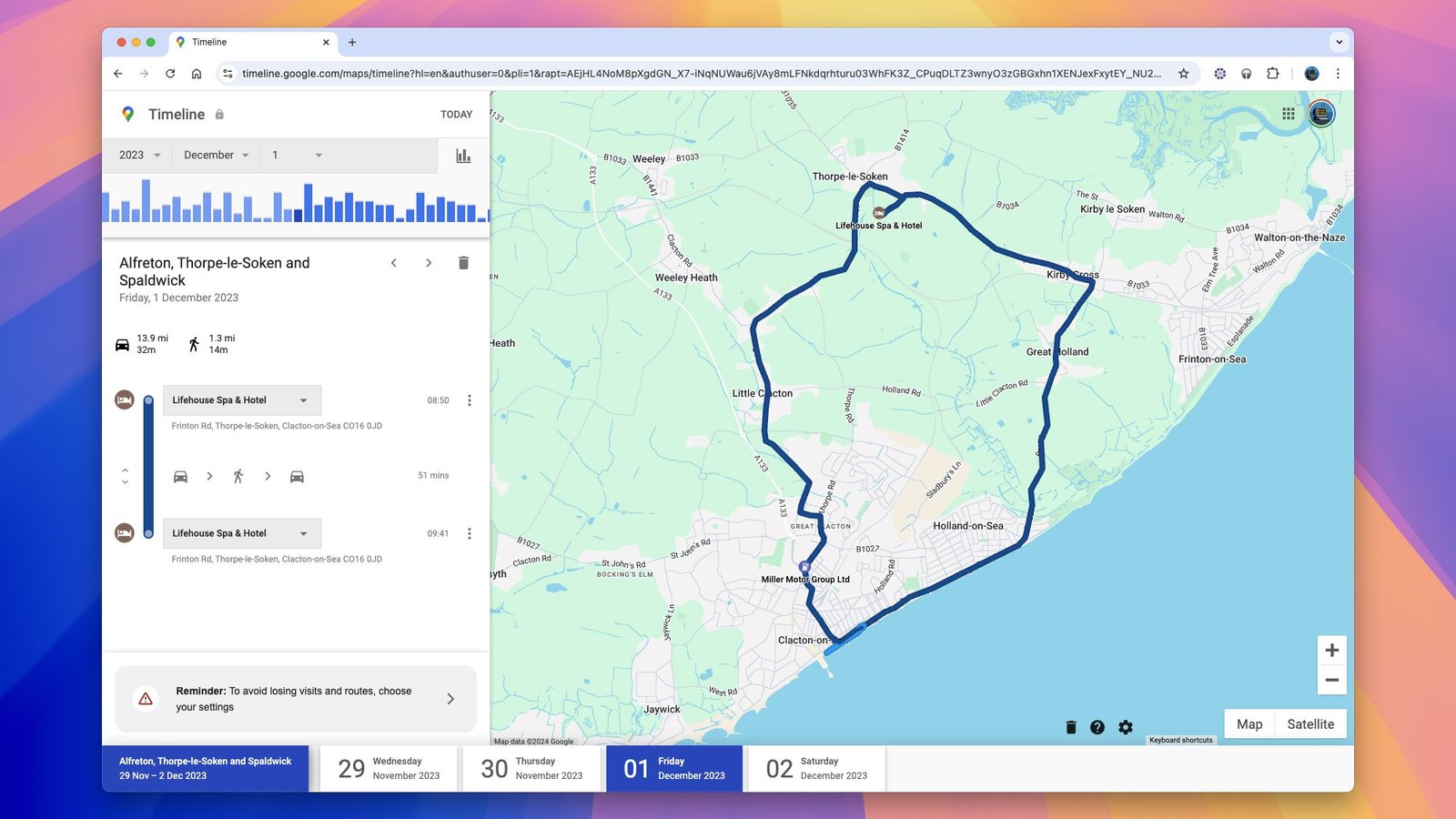Earlier this year, Google announced a big change for the Timeline feature in Google Maps, which happens to be one of its best features. While it can currently be accessed via Google Maps on the web as well as through the mobile apps, soon it will be locked to individual phones and tablets (and unless you transfer it over, all your existing data will be wiped).
The deadline for the switch seems to vary between users. Google told TechRadar that people would have “approximately six months” from when they were first notified about the changeover to get their data transferred, but 9to5Google reports many Timeline users are seeing a new deadline of June 9, 2025. If you’re affected, your best option is just to open up Google Maps on your phone and see what it says.
While I’m glad the Timeline feature is sticking around in some form, and I understand the privacy and security benefits of this data being stored on devices rather than in the Google cloud, I’m sad to see the web interface going away.
Taking a trip with Google Timeline

Credit: Lifehacker
If you’re new to Timeline, here’s how it works: The feature basically logs everywhere you go, automatically, using location information from devices linked to your Google Account. Previously you could later access this travel history via the web using your Google account. I get why that’s a privacy concern for people—perhaps the reason Google is going to lock this data locally to specific devices—but I’m prepared to trust Google to keep my comings and goings safely hidden from anyone else, because of how useful and interesting I find the feature.
I often use it to retrace the steps of past vacations, recalling the places we stopped at and the sights we saw. I also use it to look up bars, restaurants, and coffee shops I’ve liked in the past. Sometimes I’ll take a random dip into history, to see what I was doing this day last year, or this day five years ago. Everything is mapped out: Not just places, but also journeys by plane, train, or automobile (or foot).
In some ways it works like a journal I don’t need to remember to update, making entries multiple times each day. I can look back on when I last saw friends in particular places, or last visited certain countries. What’s more, Timeline keeps track of the cities I’ve seen and the miles I’ve covered, almost like fitness stats but for travel.
Timeline will continue to offer this on phones and tablets, but there will be no syncing across multiple devices. I won’t be able to load up my maps and my travels on a big screen—when it comes to viewing the map, looking up individual places, editing information, and scrolling through dates, it’s all much easier with a trackpad and keyboard.
The web interface is currently also the only way to see an overview of an entire month, or an entire year—the Google Maps app only shows data for one specific day at a time. I’ll no longer be able to see the red dots of the three-week long coast-to-coast drive my brother and I did across the United States, or see how 2018 travel compared to 2019 travel, or see how much ground I covered in January. Timeline will be less fun, and less interesting.
Going mobile with Timeline

Credit: Lifehacker
While I’m disappointed the Timeline web interface is going away—as I’m sure are many people who use it for revisiting past trips, planning future trips, figuring out travel expenses, and whatever else— the consolation is that Timeline will continue on mobile, in much the same way as it does currently.
There are even a few nice bonuses in the app version that aren’t available on the web—or at least not in the same convenient form. You can see all of the places you’ve stopped at while Timeline has been active, sorted by category and by place: So you can dig into all the hotels you’ve stayed at or all the attractions you’ve seen, or get a list of every place you’ve seen in one particular city.
Then you’ve got an Insights tab that gives you a breakdown of your travel activities: How much walking, driving, and flying you’ve done, for example, and how much time in total you’ve spent outside the home and the office. This is broken down by month, and you get a little highlights summary as well.
The Day tab doesn’t give the comprehensive map overview that you get on the web, but at least it’s something: Load it up and you can see the places you went, how you got there, and extra information such as the amount of time you spent walking and driving. As on the web, you can add in places that were missed, as well as delete or edit entries.
If you’ve never tried Timeline, or you’re getting messages asking if you want to continue using it on your phone, I’d recommend giving it a go—it’s just about my favorite Google Maps feature. As with other types of data in your Google Account, you can delete your Timeline history whenever you want, or have it automatically wiped after a certain time (once it’s more than three months old, for example).
This articles is written by : Nermeen Nabil Khear Abdelmalak
All rights reserved to : USAGOLDMIES . www.usagoldmines.com
You can Enjoy surfing our website categories and read more content in many fields you may like .
Why USAGoldMines ?
USAGoldMines is a comprehensive website offering the latest in financial, crypto, and technical news. With specialized sections for each category, it provides readers with up-to-date market insights, investment trends, and technological advancements, making it a valuable resource for investors and enthusiasts in the fast-paced financial world.
